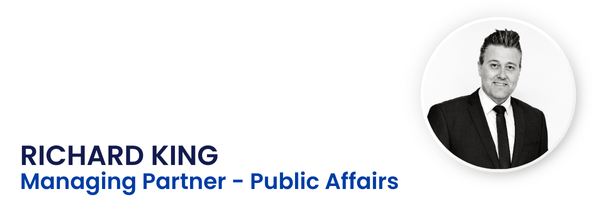Ever since both parties kicked off their pre-campaign summer blitz in January, there has been intense speculation about whether the Albanese Government will deliver a Budget – scheduled for 25 March – or send voters to the polls on 12 April. Indeed, media outlets and pundits alike are keeping a watchful eye out for C1, the Prime Minister’s car, cruising down Adelaide Avenue en route to Government House for the PM to formally request Governor-General Sam Mostyn issue the writs for an election.
However, the whirlwinds of when polling day is won’t be the only thing on voters’ minds this week. Cyclone Alfred, ironically renamed from Anthony to avoid conflicting with the Prime Minister’s first name, is lashing most of south-east Queensland and, for the first time in 35 years, northern New South Wales.
The category 2 cyclone has caused significant damage and flash flooding across the region, which may dampen the prospects of an April election and push polling day into May. Whatever the case, for both the Prime Minister and the Opposition Leader, the response to Alfred could play an important role in the election campaign.
Top talking points
📊 Exports Drive Economic Growth: The economy grew 0.6 per cent in the December quarter, driven by export growth, according to the ABS.
🍺 Beer Excise Freeze: A two-year freeze on the draught beer excise will take effect from August, aiming to ease cost pressures for brewers and hospitality businesses.
💼 Foreign Investment and Regulation Review: A future Coalition Government would reform the Foreign Investment Review Board and conduct a “stock take” on regulation, as outlined at the AFR Business Summit.
🗳 WA Votes This Weekend: Western Australians head to the polls on Saturday, 8 March, with the Cook Government expected to retain office.
🔴 Red Nose Australia Funding Restored: Up to two million dollars over three years reinstated after a bureaucratic error led to funding cuts.
Making headlines this week
Workplace gender pay gap data released
As discussions on diversity, equality, and inclusion continue in Australia and abroad, the Workplace Gender Equality Agency (WGEA) has released its annual gender pay gap report, providing new transparency on pay disparities across 7,800 individual employers and 1,700 corporate groups.
📊 Key findings include:
72 per cent of employers have a gender pay gap in favour of men.
Half of employers report a total remuneration gender pay gap larger than 12.1 per cent.
Men earn, on average, $28,425 more per year than women.
56 per cent of employers have reduced their gender pay gap in the past year.
While the data does not differentiate between causes of pay gaps, such as workforce composition or like-for-like role comparisons, it provides a clearer picture of how different industries and organisations compare.
For those interested in a deeper dive, the WGEA has launched an interactive Data Explorer, and The Guardian has also published an interactive explorer allowing users to explore gender pay gaps for specific employers.
Things to watch
👀 Election Watch: Attention turns to Government House in Canberra this weekend, where speculation is mounting over whether Anthony Albanese will call the election. Traditionally, prime ministers announce elections on a weekend, but the timing could shift if the fallout from Cyclone Alfred alters the political landscape, potentially delaying polling day into May.
Financial and market developments
Appointments to key economic agencies were confirmed this week, with Michael Callaghan reappointed as Chair of the Commonwealth Grants Commission and Dr Angela Jackson named Social Policy Commissioner at the Productivity Commission.
Meanwhile, the Coalition has adjusted its stance on divestiture powers, confirming that any potential breakup of large corporations would apply to major supermarkets only, rather than the insurance sector. This follows criticism of insurers for prioritising profits over customers, with concerns raised about pricing practices.
In competition policy, the Australian Competition and Consumer Commission (ACCC) released guidance on the new merger regulatory regime, which takes effect in January 2026. Businesses will need to comply with a mandatory notification and assessment process for acquisitions, marking a significant shift in Australia’s competition framework.
Trade leadership, defence investment, and AUKUS strategy
Dr Paul Grimes has been appointed CEO of the Australian Trade and Investment Commission, replacing outgoing Acting CEO Daniel Boyer. Dr Grimes previously served as Chair of the NSW Net Zero Commission and brings experience in public sector leadership and economic policy.
In defence, $480 million has been allocated to establish a Skills and Training Academy at Osborne, South Australia, aimed at expanding Australia’s naval shipbuilding and submarine construction workforce. In addition, the AUKUS Submarine Industry Strategy was launched to provide greater clarity for Australian businesses looking to enter AUKUS supply chains.
Offshore wind, gas exports, and environmental valuation
Feasibility licences have been awarded for offshore wind projects in southwest Victoria, Gippsland, and the Hunter, marking a step forward in Australia’s renewable energy transition. Novocastrian Wind (Equinor and Oceanex Energy) has secured a licence in the Hunter, while Spinifex has been granted approval in the Southern Ocean Zone.
In energy markets, the ACCC revealed [Paywall] in Senate Estimates that major gas exporters are planning to use domestic gas supplies to meet export commitments, raising concerns about energy security.
The first National Ecosystem Accounts have been released, measuring the economic value of Australia’s natural environment. The report estimates that grasslands, native forests, savannas, and mangroves store 34.5 million kilotonnes of carbon, valued at $43 billion, while also contributing to agricultural water supply and coastal protection.
Infrastructure investment and transport expansion
Significant infrastructure investments were announced across multiple states this week. In Tasmania, $212.7 million has been allocated to key roads and bridges, alongside an additional $43 million for upgrades in the state’s north.
In Victoria, draft structure plans for the Suburban Rail Loop (SRL) have been released for public consultation, with the project expected to support the delivery of 70,000 new homes along the rail corridor.
In Queensland, a $200 million investment was announced to expand the Brisbane Metro into the city’s northern suburbs, improving transport connectivity in the growing region.
Medicare expansion, aged care wages, and education funding
A $644 million commitment has been announced to expand Medicare Urgent Care Clinics, with an additional 50 clinics to be opened across the country. At the same time, private health insurance premiums will increase by 3.73 per cent, following an annual review.
In aged care, a $2.6 billion investment will fund another pay rise for 60,000 aged care nurses, with registered nurses set to receive an average 12 per cent wage increase.
A new joint funding agreement will provide an additional $4.8 billion in Commonwealth funding to New South Wales public schools over the next decade.
In case you missed it...
📺 Former Prime Minister Tony Abbott on Australia’s defence readiness warning against complacency in the face of rising threats:

